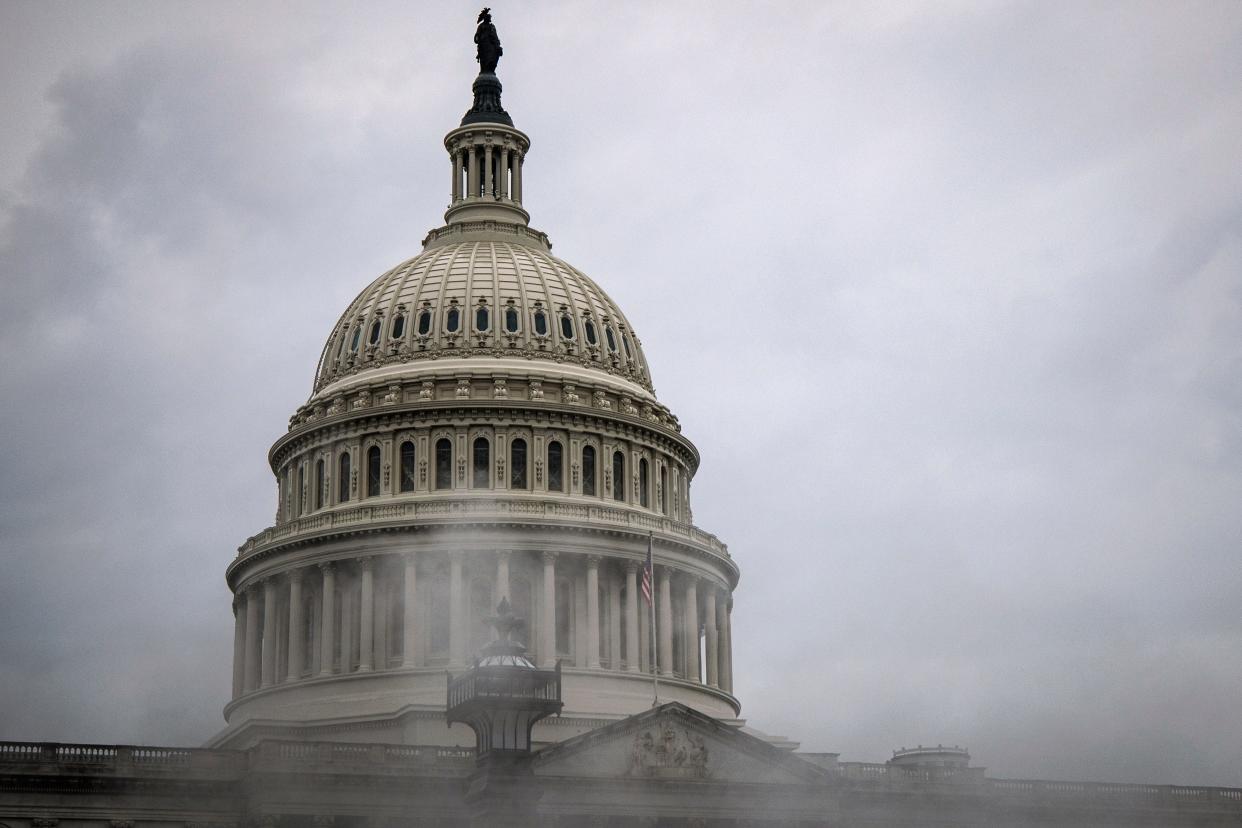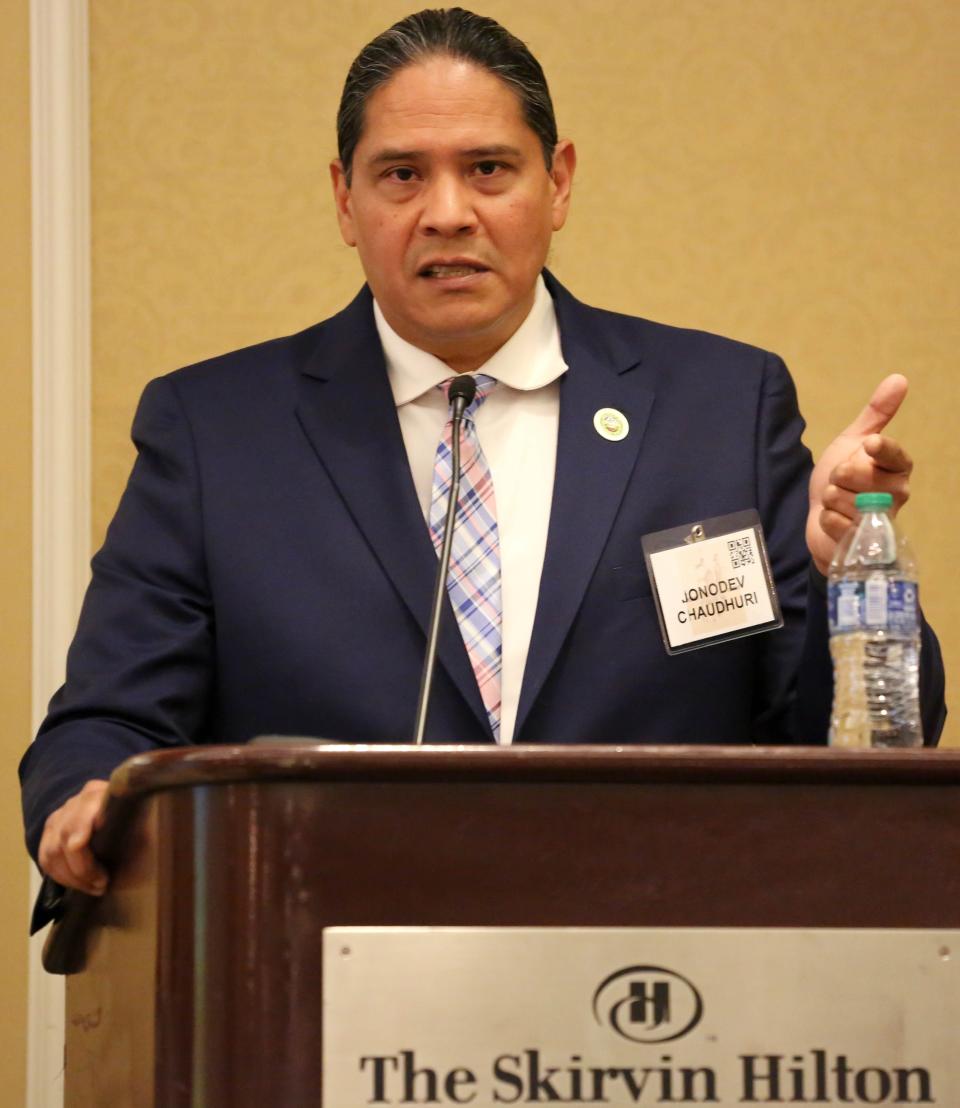Congress needs to address public safety crisis on tribal reservations, leaders say

- Oops!Something went wrong.Please try again later.
- Oops!Something went wrong.Please try again later.
Tribal nations need more money from Congress to keep people safe, their leaders told federal lawmakers.
Officials representing tribes in Oklahoma and 14 other states said Wednesday that inadequate funding has hamstrung their criminal justice systems, leaving them unable to fully address the opioid crisis. Many leaders also called on Congress to restore the power of tribal courts over all people suspected of dealing drugs and committing other crimes on reservations, not just those who are Native.
“There’s a commonality with all of the problems, and the commonality is that tribal nations have been handcuffed in their ability to protect their own,” said Jonodev Chaudhuri, an ambassador and citizen of the Muscogee Nation in eastern Oklahoma.
More: Oklahoma AG challenges Muscogee Nation's case against county jailer over dispute caught on video
Chaudhuri and the other tribal officials were speaking at a listening session held by the Senate Indian Affairs committee. Sen. Brian Schatz, a Hawaii Democrat who chairs the committee, said hearing about the most pressing public safety issues facing tribal nations would help lawmakers prioritize their next steps.
Sen. Jon Tester acknowledged no single fix would solve the crises many tribal communities face. Tribal and federal law enforcement agencies need more resources across the board to begin solving the problems, said Tester, a Montana Democrat.
“We’ve got cartels in Indian Country,” he said. “We’ve got a lot of bad s--- going on.”
Tribal nations ask Congress to expand the power of tribal courts over non-Native defendants
The discussion on Capitol Hill landed as several tribal nations in Oklahoma work to expand their criminal justice systems across their reservations after regaining legal recognition in the past four years.
Charles Addington, who leads the Quapaw Nation Marshals Service in the northeast part of the state, said federal funding often stays at the federal level — within agencies like the Bureau of Indian Affairs, which has its own law enforcement arm — rather than reaching tribal nations directly.
“In order to make a difference, you’ve got to make sure you’re being partners with these tribal law enforcement programs,” said Addington, a Cherokee Nation citizen.
More: Oklahoma task force looks to resolve tribal reservation safety issues without tribal nations
The current system creates a checkerboard approach to addressing crime and enforcing the law, Chaudhuri said.
“The solution is empowering local governments on the ground,” he said. “That’s always been the solution.”

He joined more than a dozen other tribal leaders in asking for Congress to pass a law that would expand the power of tribal courts over non-Native defendants. The Supreme Court ruled in 1978 that tribal courts do not have inherent criminal jurisdiction over people who aren’t Native American, and that only Congress can assign that jurisdiction.
Lawmakers have done so as recently as 2022, when they extended the jurisdiction of tribal courts to cover anyone accused of sexually abusing, trafficking or stalking a Native person, as well as some other related crimes.
Congress should extend that list to cover all crimes on tribal lands, said Mark Macarro, chairman of the tribal chairman of the Pechanga Band of Luiseño Indians in California and president of the National Congress of American Indians.
“Indian Country is in acute crisis right now, and has been for decades actually. Crisis in law enforcement, crisis in public safety, crisis in justice,” he said. “One of the fundamental solutions is the restoration of our own sovereign governments to protect our citizens in their own homes and on our lands.”
'We are the first people of this country, and yet we're always overlooked'
Sen. Lisa Murkowski, an Alaska Republican and vice chair of the Indian Affairs committee, said she and other lawmakers hope to take the input of tribal leaders and build their perspectives into future policies.
Jeff Stiffarm, president of the Fort Belknap Indian Community in Montana, said he hoped the listening session was not just a way for lawmakers to check off a box. Tribal nations need Congress to fulfill the United States’ trust responsibility to tribes, he said.
“We are the first people of this country, and yet we’re always overlooked,” Stiffarm said.
One of the most repeated concerns was the inability to recruit and retain police officers because federal funding does not match the actual need. Many tribal leaders said their police forces were operating with far fewer officers than needed to patrol huge swaths of land.
J. Michael Chavarria, the governor of the Santa Clara Pueblo in New Mexico, said his tribe can only afford to hire officers at $25 an hour. Security officers at the nearby Los Alamos National Lab can start out making about twice as much, he said.
Tribal police officers also can’t join the federal pension system or access disability or death benefits, which makes retention exceptionally difficult, several tribal officials said.
“We can’t enforce the law if we don’t have any law enforcement officers,” said Manuel Heart, chairman of the Ute Mountain Ute Tribe in Colorado.
This article originally appeared on Oklahoman: Tribes need more power to address crime on reservations, officials say

